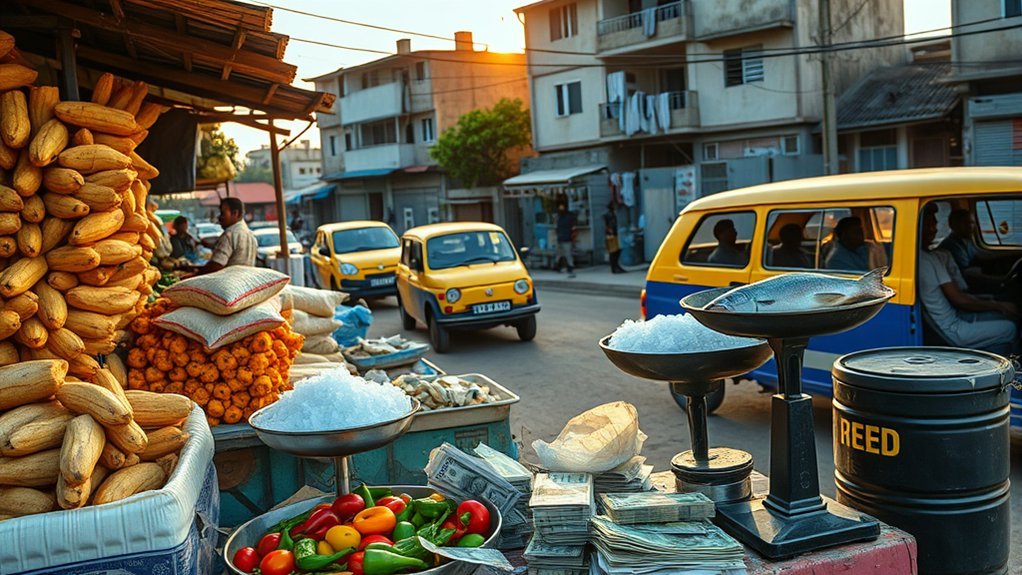You’ll typically need $1,500–$3,000 monthly to live comfortably in Monrovia, about 24.6% cheaper than the U.S. overall. Rent varies widely: expect around $667 for a one‑bed downtown or about $95 outside center. Utilities for two run near $85, public transit is roughly $20/month, and groceries can be pricier (milk ~$8/gal). Healthcare, visas, and shipping add costs, but strategies can cut spending—keep going to see specifics and tips.
Overview of Liberia’s Cost of Living
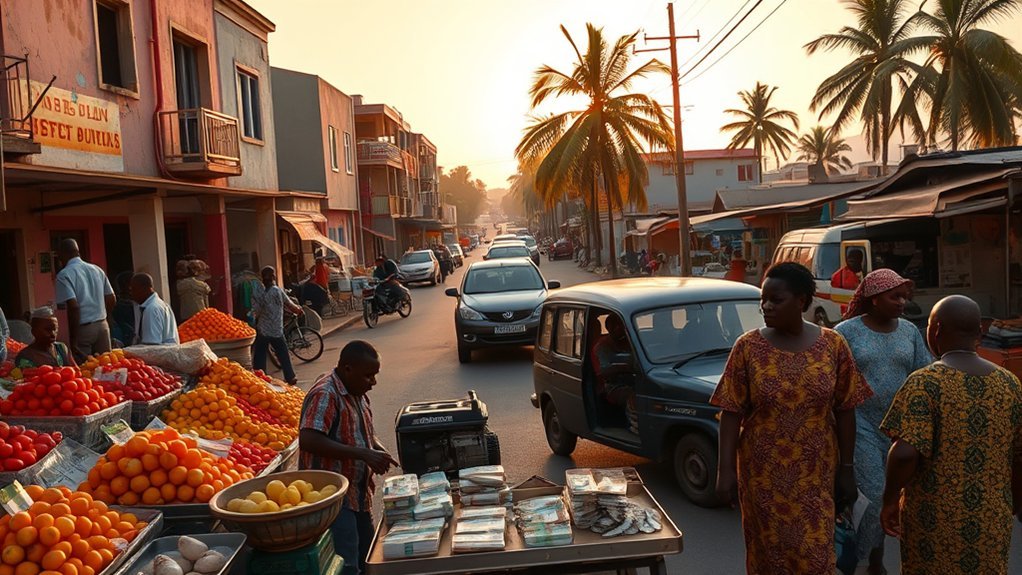
While overall living in Liberia is about 24.6% cheaper than in the United States, costs vary sharply by category: you’ll pay much less for housing and transport but more for groceries.
In practical terms, the Cost of Living in Liberia is uneven: housing costs are a clear savings — a one-bedroom city-center apartment averages $666.67 versus $1,664.59 in the U.S. — and public transit runs about $20 monthly compared to $65.85.
Yet grocery prices skew higher; staples like a gallon of milk cost roughly $8.01 versus $3.97 in the U.S., which will raise your food budget.
Grocery costs are higher — a gallon of milk runs about $8, noticeably increasing your food budget compared to the U.S.
Monthly living expenses in Monrovia typically span $1,500–$3,000, so your baseline depends on lifestyle and accommodation choices.
If you’re evaluating relocation or salary offers, weigh lower housing costs and transport against elevated grocery spending and variable expat salaries that influence disposable income and purchasing power in Liberia.
Monthly Budget Estimates for Expats and Locals
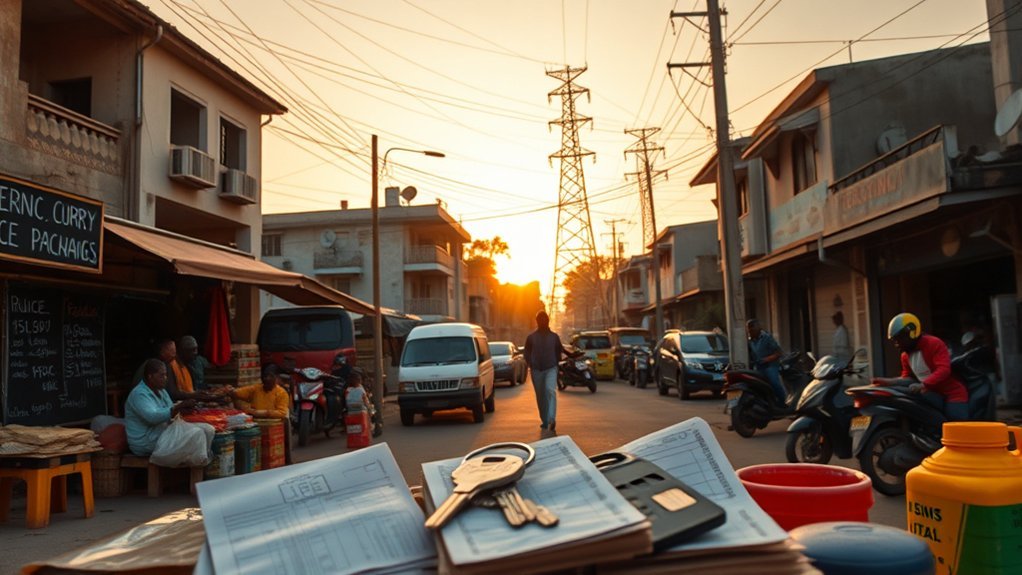
When planning your monthly budget in Monrovia, expect basic living expenses to fall between $1,500 and $3,000 depending on lifestyle and housing choices.
Housing and utilities are relatively affordable — a city-center one-bedroom averages about $666.67 and two-person utilities around $85.26 — while transportation and food will absorb the remainder, keeping overall costs well below typical U.S. levels.
Basic Living Expenses
Although costs vary by lifestyle and neighborhood, you can expect monthly living expenses in Monrovia to fall roughly between $1,500 and $3,000 for expats, driven largely by housing choices and imported groceries.
Using United States data points for comparison helps you see trade-offs: rent in Monrovia is markedly lower (one-bedroom downtown about $666.67 versus $1,664.59 in the U.S.), while groceries can be pricier—milk at $8.01/gal, roughly 75.3% higher than U.S. prices.
Transportation is affordable; a monthly public transit pass runs about $20.00 compared to $65.85 in the U.S.
If you earn an expat salary ($3,000–$12,000/month), these differences determine discretionary spending and savings potential, with imported goods shaping most budget pressures.
Housing and Utilities
Housing costs in Monrovia are particularly lower than in the U.S., so you can free up a significant portion of your budget for other needs or savings: a downtown one‑bed runs about $666.67/month versus $1,664.59 in the U.S., and outside the city center you’ll pay roughly $95.00 compared with $1,416.15; overall, housing is about 40.3% cheaper in Liberia.
| Item | Monthly Cost (USD) |
|---|---|
| Downtown 1‑bed | 666.67 |
| Outside city 1‑bed | 95.00 |
| Utilities (2 people) | 85.26 |
You’ll find the rental market skewed toward lower rents; utility providers charge about half U.S. levels. For expats and locals alike, housing trends favor affordability, but quality and supply vary by neighborhood, so inspect properties and vet providers.
Transportation and Food
Because public transit in Liberia costs roughly $20/month—about a third of the U.S. average—you can expect lower recurring travel expenses, with overall transportation running ~30.3% cheaper (a typical 5‑mile taxi is ~$12.69 vs $17.61 in the U.S.).
For budgeting, factor a monthly public transit pass and occasional taxis; public transport options are affordable and make daily commuting cheap.
Food spending is mixed: inexpensive restaurant meals average $7.50 versus $19.45 in the U.S., while fast food combos are similar (~$11.00).
Groceries can be pricier overall—milk at ~$8.01/gallon—but some staples like apples are cheaper (~$0.74/lb).
You’ll balance lower dining experiences and transit with higher grocery costs by using local food markets and smart meal planning.
Housing and Utilities: Prices and Tips
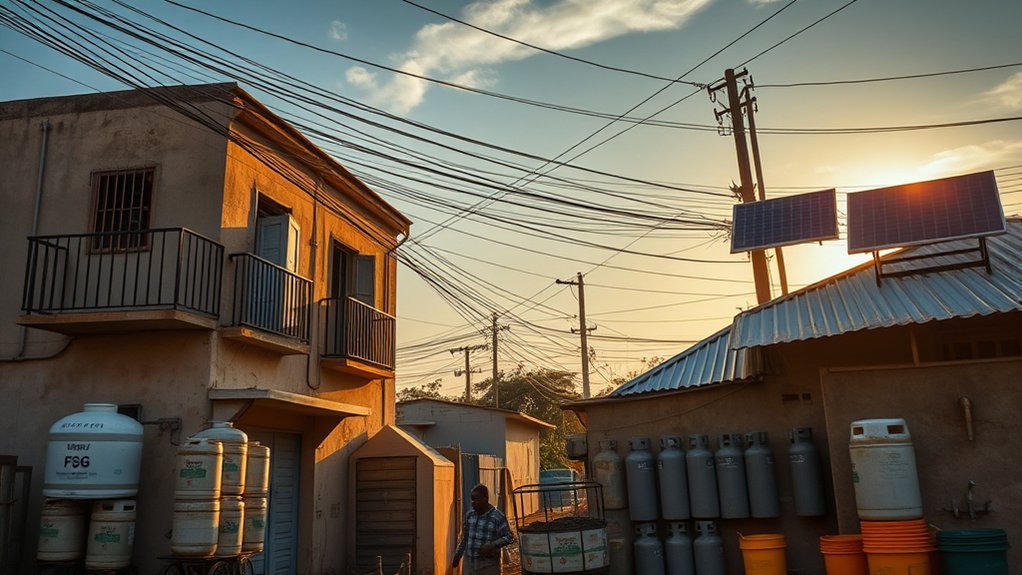
One clear cost advantage in Liberia is rent: a one-bedroom in downtown Monrovia runs about $666.67 while the same unit outside the city center drops to roughly $95.00, reflecting a market that’s about 40.3% cheaper than U.S. averages.
You’ll find the rental market sharply bifurcated—central units offer convenience and higher rents, suburban options deliver pronounced savings.
Utilities for a two-person household in a 700 sq ft apartment average about $85.26 monthly, illustrating notable utility savings versus U.S. norms and lowering your total housing burden.
Utilities for a two-person household in a 700 sq ft apartment average just $85.26 monthly, easing housing costs.
When you compare total housing costs, factor in local conditions: service reliability, transport access, and neighborhood amenities.
If you’re an expat or relocating family, weigh housing options against childcare savings too—private preschool runs only $129.33 per month here, a fraction of U.S. costs.
In short, choose downtown for access and security, choose outskirts for dramatic cost reductions, and budget for occasional utility variability despite generally lower bills.
Food and Grocery Costs Across Cities
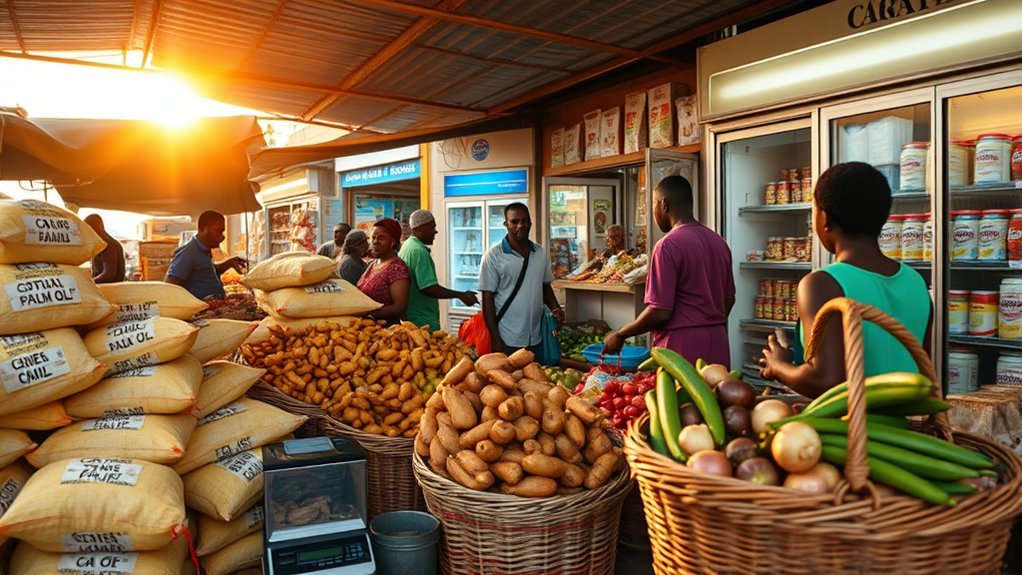
While grocery prices in Liberia vary by city, overall food costs run markedly higher than in the U.S., with staples like milk costing $8.01 per gallon—about double the U.S. price—yet some items such as bread ($1.79/loaf) and apples ($0.74/lb) are cheaper; bananas buck the trend at $3.83/lb, far above U.S. levels.
You’ll see a clear grocery price comparison when moving between Monrovia and smaller towns: urban centers often list imported goods at premiums, while local markets offer lower-cost produce.
Use food sourcing strategies like buying bread and apples locally, shopping open-air markets for seasonal items, and limiting imported dairy to control your budget.
Local market insights show variability driven by supply chains, import costs, and local production.
If you prioritize staples available domestically and adjust shopping frequency, you can offset higher average food spending—remember the national average is about 75.3% costlier than U.S. grocery bills, so planning matters.
Transportation, Healthcare, and Education Expenses
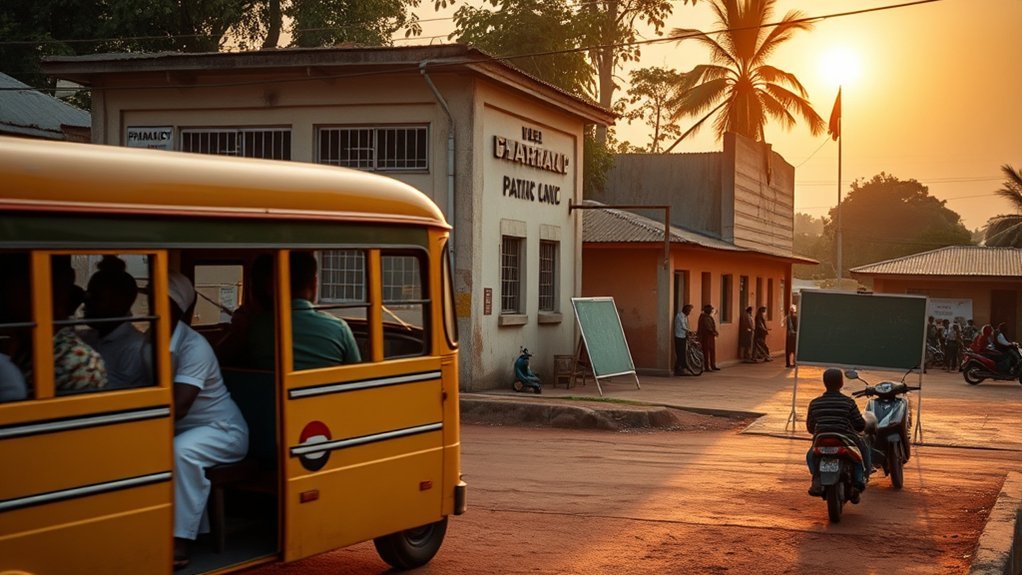
You’ll find public transit in Liberia is relatively inexpensive — a monthly pass runs about $20 versus roughly $65.85 in the U.S., and typical downtown taxi trips (5 miles) average $12.69 compared with $17.61 stateside.
Healthcare costs and insurance vary widely by provider and coverage, and while basic care can be cheaper, limited availability and quality in rural areas often push expatriates to seek treatment abroad.
Public Transit and Costs
Because public transit and everyday services are especially cheaper in Liberia, your monthly commuting and childcare bills will likely be much lower than in the U.S.; a monthly transit pass runs about $20 versus the U.S. average of $65.85, and a downtown taxi trip (around 5 miles) costs roughly $12.69 compared with $17.61 in the U.S. at the same distance.
You’ll find public transit options primarily include minibuses and shared taxis; fare comparison shows clear savings for regular riders.
Note gasoline is pricier at about $4.69 per gallon, so driving can erode savings.
Transit accessibility varies by city and route frequency, so factor in walk times and schedule reliability when estimating monthly commuting costs and choosing between transit, taxis, or private car use.
Healthcare Fees and Insurance
Although healthcare fees in Liberia are generally lower than in many high-income countries, costs and access vary widely: a typical clinic consultation runs about $20–$50, but you’ll often need private insurance (roughly $1,000–$3,000/year) to access better-equipped hospitals.
You’ll face healthcare accessibility challenges in rural areas, where quality facilities are scarce and you may need a $12.69 taxi to reach urban centers for serious care.
When planning, compare private insurance options for coverage limits, evacuation, and foreign provider networks.
Don’t forget vaccination requirements costs: yellow fever shots cost $50–$100 and are mandatory for visa processing.
Visa, Residency, and Moving Costs From the USA
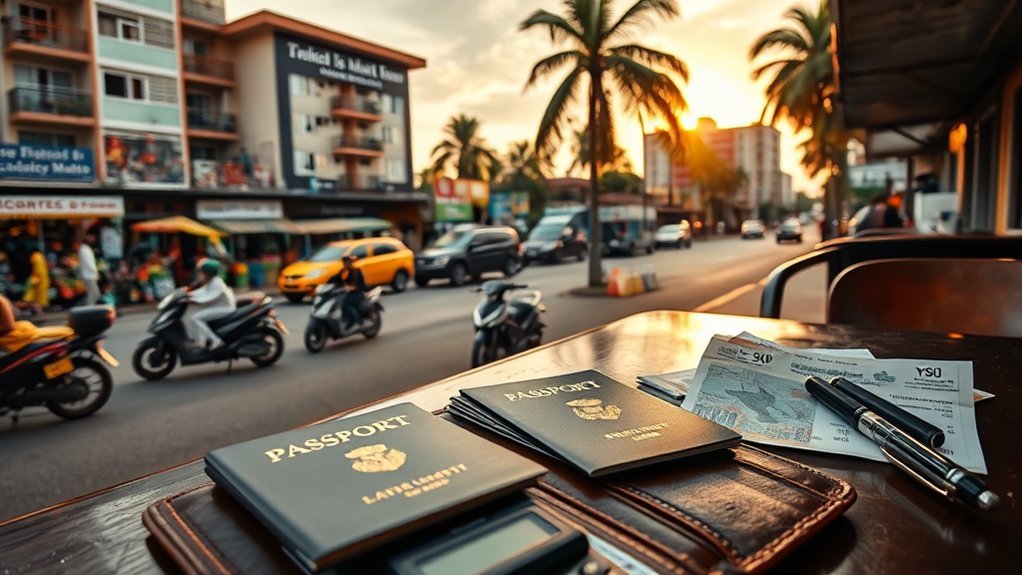
When planning a move from the U.S., factor in visa requirements, residency options, and shipping costs because they can materially affect your budget and timeline.
Liberia’s visa types include a Single Entry Visa (up to 3 months) and Multiple Entry Visas (one- or two-year, with a three-year option), so match duration to employment or retirement plans. For long-stay visas you’ll need an invitation letter or proof of sponsorship; all applicants must show yellow fever vaccination and health insurance.
Compare expat salaries—typically $3,000–$12,000 monthly—to estimate affordability against local costs and visa-related fees.
Moving logistics from the U.S. often demand international shipping with a minimum 80 cubic feet for a free pre-move survey; that threshold affects container selection and cost per cubic foot.
Budget for documentation, potential residency processing, and higher shipping tiers if you exceed 80 cu ft. Using these data points, you can project realistic timelines, cash reserves, and whether short-term entry or multi-year residency fits your financial plan.
Tips to Lower Living Costs and Where to Find Help
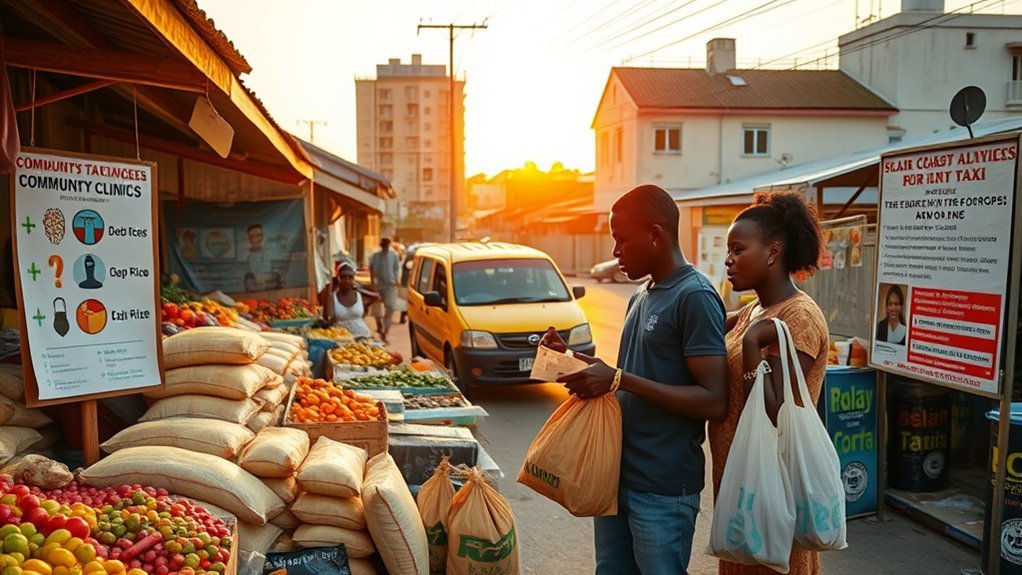
After you’ve accounted for visas, shipping, and residency timelines, start cutting monthly bills by comparing local prices and services to U.S. equivalents: groceries like apples run about $0.74/lb versus $2.37 in the U.S., public transport monthly passes are roughly $20.00 versus $65.85, and a one-bedroom outside city centers can drop to $95.00 compared with $1,416.15.
Use these benchmarks to target specific savings (food, transit, housing, childcare) and prioritize cost reductions that yield the largest percentage gains. Audit your spending, then apply budgeting strategies: shift grocery shopping to local markets, replace car use with $20 monthly passes, and consider outskirts rentals to cut rent drastically.
Factor childcare savings—private preschool at about $129.33/month versus $1,387.27—into total household budgets. Tap community resources and expat networking for vetted providers, shared childcare co-ops, and bulk-buy options.
Use online forums and local groups to validate prices and negotiate services; data-driven comparisons will keep your cost-cutting focused and measurable.
Frequently Asked Questions
How Much Money Do You Need to Live in Liberia?
You’ll need about $1,500–$3,000 monthly for Liberia, considering cost of living, cheaper housing expenses versus the U.S., but higher prices for daily necessities; compare salaries and adjust for lifestyle, location, and family size.
Can Americans Move to Liberia?
Yes — unsurprisingly, you can move: Visa requirements demand yellow fever vaccination, insurance, Single or Multiple Entry visas; Cultural adaptation varies regionally; Cost of living compares $1,500–$3,000 in Monrovia versus lower elsewhere.
Is Liberia a Good Place to Live?
Yes — you can enjoy rich cultural experiences and local cuisine, but you’ll weigh safety concerns, limited services, and variable costs; compared to nearby countries, Liberia offers unique opportunities yet demands careful, data-driven planning for relocation.
What Is the Average Salary in Liberia in USD?
You’ll earn roughly $300–$12,000 monthly on average, depending on role; expatriate average income levels sit $3,000–$12,000, locals often under $500. You’ll weigh employment opportunities against cost comparisons and inflation.
Conclusion
You can live modestly in Liberia on about $400–$800 monthly as a local, while expats typically budget $1,200–$2,500. For example, Sarah, an NGO coordinator from the US, spends $1,600/month: $700 rent, $300 food, $200 transport, $150 utilities/comms, $250 healthcare/schooling. Compared to neighboring countries, Liberia’s housing is cheaper but imported goods cost more, so prioritize local markets and shared housing to cut costs without sacrificing quality of life.

